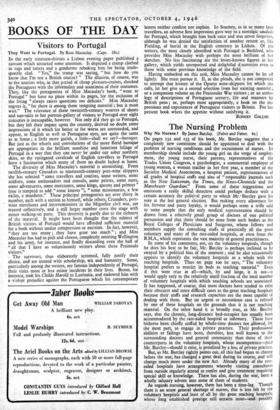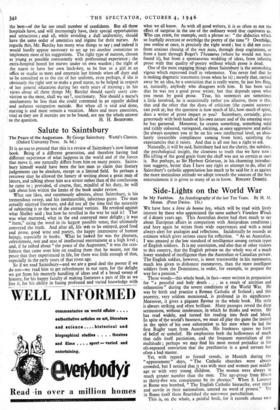The Nursing Probleth
Why No Nurses ? By James Barclay. (Faber and Faber. 6s.) ON pages 152 and 153 of his book, Mr. Barclay suggests that a completely new committee should be appointed to deal with the problem of nursing conditions and the recruitment of nurses. Its membership should include the young girl on the verge of employ- ment, the young nurse, their parents, representatives of the Trades Union Congress, a psychologist, a commercial employer of young women, a woman teacher in her first year, a member of the Socialist Medical Association a hospital patient, representatives of all grades of hospital staffs and also of " responsible journals such as the New Statesman, the Times, the News-Chronicle and the Manchester Guardian." From some of these suggestions and omissions a really skilful detective could perhaps deduce with a certain accuracy the politkal party to which Mr.= Barclay gave his vote at the last general election. But making every allowance for his fervour and party loyalty, it would perhaps seem a trifle odd to some people that the only medical representation should be drawn from a relatively kmall group of doctors of one political persuasion and that there should be none from such bodies as the Royal Colleges of Physicians and Surgeons, whose fellows and members supply the consulting staffs of practically all the great voluntary and many of the rate-aided hospitals, or even from the B.M.A., which represents the vast majority of general practitioners. In some of his comments, too, on the voluntary hospitals, though he does his best to be fair, Mr. Barclay is. perhaps inclined to be swayed by a political bias of the moment ; and he also occasionally appears to identify the voluntary hospitals as a whole with the teaching hospitals. Thus on page too he says, "The voluntary hospital prefers to restrict its beds to teaching material." Even if this were true at all—which, by and large, it is not—it would apply only to the relatively small fraction of the total number of voluntary hospitals with which teaching schools are associated. It has happened, of course, that most doctors have tended to refer their obscurer and more difficult cases to the great teaching hospitals because their staffs and research capacities are the most capable of dealing with them. But no urgent or necessitous case is refused by one of these hospitals on the grounds that it is not teaching material. On the other hand it is broadly true, as Mr. Barclay says, that the chronic, long-distance bed-occupier has usually been accommodated by the rate-aided hospital or infirmary. These have hitherto been chiefly staffed by whole-time doctors not allowed, for the most part, to engage in private practice. Their professional abilities or failings have been, therefore, less well known to the surrounding doctors and general community than those of their counterparts in the voluntary hospitals, whose incompetence—pace Mr. Barclay—should it exist, is penalised by a loss of private practice.
But, as Mr. Barclay rightly points out, all this had begun to change before the war, has changed a great deal during its course, and will change much more under the new Act. Already many of the rate- aided hospitals have arrangements whereby visiting consultants from outside regularly attend to confer and give treatment requiring special skill or knowledge. There has also, during the war, been a wholly salutary advent into some of them of students.
As regards nursing, however, there has been a time-lag. Though there is an acute general shortage of nurses, this is less felt by the voluntary hospitals and least of all by the great teaching hospitals, Whose long established prestige still attracts most—and possibly
the best—of the far too small number of candidates. But all these hospitals have, and will increasingly have, their special opportunities and attractions ; and all, while avoiding a dull uniformity, should have the same order of amenities and regime for their nurses. As regards this, Mr. Barclay has many wise things to say ; and indeed it would hardly appear necessary to set up yet another committee to implement most of his suggestions. The right type of matron, chosen as young as possible consistently with professional experience ; the extra-hospital hostel for nurses under its own warden ; the right of the nurse to have her own latch-key, to be free as a girl in an office or studio to meet and entertain her friends when off duty and to be consulted as to the cut of her uniform, even perhaps, if she is obviously the right sort to make a good nurse, to be helped in respect of her general education during her early years of training ; in his views about all these things Mr. Barclay should surely carry con- viction to the most, shall we say?, reactionary. Nor should a nurse's emoluments be less than she could command in an equally skilled and arduous occupation outside. But when all is said and done, nursing is and must remain a vocation. Mere and more amenities, vital as they are if recruits are to be found, are not the whole answer































 Previous page
Previous page